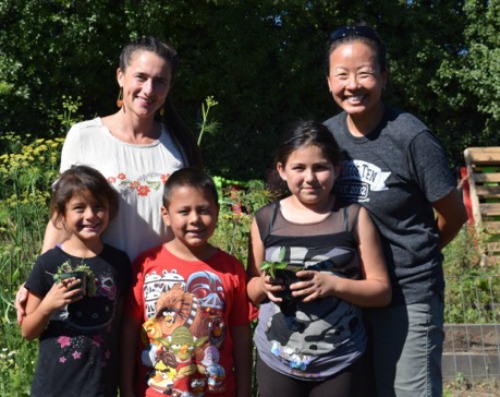Campus News
UC Santa Cruz project wins U.S. agriculture grant to diversify food studies
A $275,000 grant from the U.S. Department of Agriculture will help Colleges Nine and Ten at UC Santa Cruz expand projects in Santa Cruz and Monterey counties to promote food security and food justice among predominantly Spanish-speaking, farmworker families.

A $275,000 grant from the U.S. Department of Agriculture will help Colleges Nine and Ten at UC Santa Cruz expand projects in Santa Cruz and Monterey counties to promote food security and food justice among predominantly Spanish-speaking, farmworker families.
The program, funded through a Hispanic Serving Institutions initiative of the USDA’s National Institute of Food and Agriculture, will help recruit, retain, and engage underrepresented undergraduates at UC Santa Cruz as well as benefit elementary and high school students in the communities of Watsonville and Gonzales.
“Diversifying Food Studies and Fostering Community Food Security” builds on work Colleges Nine and Ten students have under way with community gardens at Calabasas School in Watsonville, said project director Flora Lu, associate professor of environment studies and provost for the two colleges. Stacy Philpott, associate professor of environmental studies and Ruth and Alfred Heller Chair in Agroecology, is co-project director.
“The colleges are microcosms of innovation,” Lu said, explaining how the community garden program at Calabasas School began three years ago as a program aligned with College Ten’s theme of social justice and community. Students volunteered at the school last spring for an alternative spring break.
Lu said the key component of the project is to help retain UC Santa Cruz students from underrepresented groups who are often the first in their families to attend university.
While UC Santa Cruz has made significant progress in increasing enrollments of underrepresented students in agricultural science programs, little work has been done to understand the viewpoints, expectations, and experiences of these undergraduates once they arrive at college, she said.
Working with school children and families in communities similar to where they grew up both provides real world experiences and positions them as mentors for younger students, she said.
Lu estimates that 150 elementary school children will benefit from the after-school, garden-based program and community garden supported by UC Santa Cruz interns. Additionally, the program will help approximately 70 high school students build skills around food justice, and more than 400 undergraduate college students will benefit from new curricula, and volunteer, service learning, and research opportunities. Also, it is expected that as many as five graduate students will assist with project research, and program development and dissemination.
Program manager is a UC Santa Cruz alumna, Emily Beggs (Cowell ’08, Latin American and Latino studies and politics). “I’m excited because in my work and my life, I see food as the tool to create connection and inclusion and bring people together. We can use food to get students more connected,” she said.
Between UC Santa Cruz and graduate studies at Stanford, Beggs worked in an urban garden in Oakland. She said UCSC is at the forefront of developing a model of food and agriculture-based education. “You don’t see food and justice programs happening at other universities. This is an exciting opportunity to build programs that other universities can follow,” she said.
U.S. Rep. Sam Farr, D-Carmel, a longtime supporter of agriculture initiatives on the Central Coast, praised the program. “Fostering food security to ensure families have access to healthy meals allows people and families to focus on getting a better education, a better job, more training and other activities to uplift themselves,” he said.
“UC Santa Cruz has long served our community through a variety of outstanding education and outreach programs and I look forward to working with them more during my last few months in Congress,” Farr said.